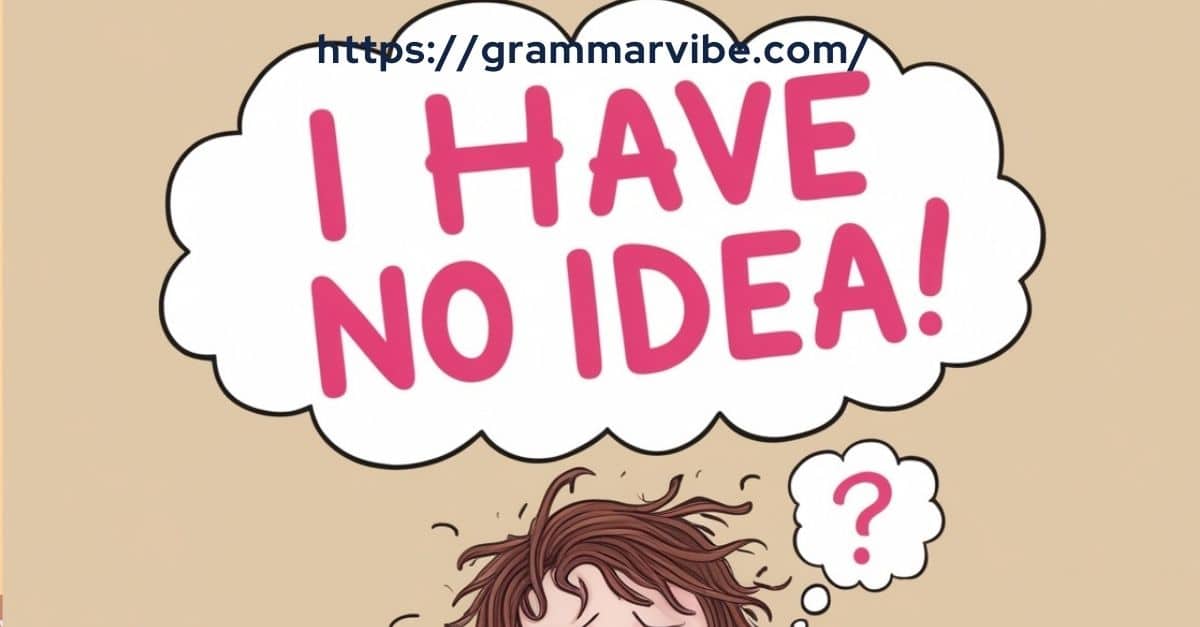Admitting when you don’t know something is a natural part of communication. However, constantly saying “I have no idea” can sound repetitive, abrupt, or even dismissive. Whether you’re in a casual chat with a friend, a professional discussion, or responding to a question in a work email, there are many alternative ways to express uncertainty that can help maintain politeness and professionalism. By using varied phrases, you not only sound more respectful but also communicate more effectively.
Below we will explore 15 alternative expressions for “I have no idea,” each accompanied by scenarios and examples to help you choose the right words based on your situation. Whether you are lacking knowledge on a specific topic, struggling to recall something, or feeling confused, these responses will allow you to express uncertainty in a manner that fits the tone of the conversation.
1. “I’m Not Sure”
This is one of the most common and polite alternatives to “I have no idea.” It’s informal yet respectful and works well in both personal and professional conversations.
Example:
Email to a coworker:
Hi Sarah,
I reviewed the proposal, but I’m not sure about the financial projections. Could you provide some clarification before we present it to the client?
Best regards,
John
Using “I’m not sure” shows that you’re uncertain but still approachable. It leaves room for others to provide input without sounding dismissive or abrupt.
2. “I Don’t Have the Answer”
This phrase is simple and direct but still diplomatic. It’s ideal when you need to admit that you don’t have the information requested.
Example:
Message to a team member:
Hi Mark,
I don’t have the answer to your question about the software update. I’ll need to consult with the IT department and get back to you.
Cheers,
Rachel
This phrase also sets up the expectation that you will follow up, showing willingness to help even if you don’t have an immediate answer.
3. “I’m Unsure”

“I’m unsure” can sound slightly more formal than “I’m not sure,” but it’s still a polite way to acknowledge that you lack confidence on a subject.
Example:
Conversation with a client:
Client: Can you tell me if this software will integrate with our existing system?
You: I’m unsure, but I will confirm with our technical team and get back to you shortly.
The use of “unsure” adds a layer of humility to the conversation, suggesting that you are open to learning more and providing an accurate answer.
Check out this: 15 Other Ways to Say “Happy New Month”
4. “I’m Not Knowledgeable on That Topic”
Sometimes, being honest about your lack of expertise in a specific area is the best approach. Saying, “I’m not knowledgeable on that topic,” shows that you’re transparent about your limitations while remaining professional.
Example:
In a meeting with a colleague:
You: I’m not knowledgeable on that topic, but I can reach out to someone in the department who can give us more insight.
By acknowledging your lack of expertise, you’re showing professionalism and honesty, which can foster trust.
5. “I’m Afraid I Can’t Help You with That”
This polite phrase is an excellent way to gently inform someone that you cannot provide the requested information. It works well in both formal and casual settings.
Example:
Customer service response:
Customer: Can you give me an update on my order status?
You: I’m afraid I can’t help you with that, but I can direct you to our support team who will have the details.
The regretful tone helps to soften the refusal, ensuring the other person doesn’t feel dismissed.
6. “I’m Not Familiar with That”
This response works well when you’re unfamiliar with a subject, product, or concept. It’s a neutral phrase that doesn’t carry negative connotations.
Example:
Team email:
Hi Alex,
I’m not familiar with that vendor, but I’ll look into it and let you know if I find any relevant information.
Best,
Emily
By using “not familiar”, you’re suggesting that you haven’t encountered the topic before but are open to learning about it.
More for you: 15 Other Ways to Say “Happy Wedding Anniversary”
7. “I Don’t Have Any Information on That”
This phrase is straightforward and works especially well when you’re speaking about specific details or data that you don’t possess.
Example:
In a business discussion:
Boss: Do you know when the new marketing materials will arrive?
You: I don’t have any information on that at the moment, but I’ll check with the supplier.
By being direct about your lack of information, you avoid giving false impressions and can suggest alternative ways to find answers.
8. “I’m Clueless”
Although more informal, “I’m clueless” can convey humor and self-deprecation, making it a good choice for light-hearted conversations. Just be cautious of the tone when using it in a professional setting.
Example:
Friend: What’s the plot of the movie we’re watching tonight?
You: I’m clueless! I didn’t read the reviews, but let’s watch and find out!
This is a friendly way to admit ignorance without making it awkward.
9. “I’m Not the Best Person to Ask About That”
This phrase works well in professional settings when you want to admit that you don’t have the knowledge or expertise to answer a question but are offering to direct the person to someone who does.
Example:
Replying to a work email:
Hi Susan,
I’m not the best person to ask about the new accounting software, but I suggest you contact Jane, who handles that area.
Cheers,
Chris
This response is diplomatic and polite, while still being clear about your limitations.
You might also like: 15 Other Ways to Say “Good Luck in Your Future Endeavors”
10. “Let’s Take a Closer Look at That”
This phrase shows proactiveness and a willingness to explore the subject further, which can be more constructive than simply admitting ignorance.
Example:
Team discussion:
You: That’s an interesting question, but I’m not sure about the specifics. Let’s take a closer look at the data, and I’ll get back to you with more details.
Using this phrase allows you to express uncertainty while also demonstrating problem-solving skills and a desire to collaborate.
11. “I Can’t Provide an Answer Right Now”
When you need more time or resources to respond properly, this phrase can be a polite and responsible way to say you don’t know.
Example:
During a client meeting:
Client: Do you have a quote for this project yet?
You: I can’t provide an answer right now, but I’ll make sure to have it for you by the end of the day.
This response is respectful and sets clear expectations, giving you time to gather the necessary information.
12. “I’m Stumped”
When you’re facing a particularly tricky question or problem, “I’m stumped” conveys that you’ve reached an impasse. It’s casual but still effective.
Example:
Friend: How do you think they’ll solve this puzzle?
You: I’m stumped! But I’m sure we’ll figure it out together.
This phrase adds a bit of humor while showing you’re engaged and still interested in solving the issue.
13. “Your Guess is as Good as Mine”
This informal expression suggests mutual uncertainty. It’s perfect for conversations where you want to convey that you both have equal chances of knowing the answer.
Example:
Colleague: Do you know what the outcome of the meeting will be?
You: Your guess is as good as mine, but I’m hoping for the best!
This phrase can make conversations feel more like a shared experience, especially in collaborative settings.
14. “I’m in the Dark”

This is another neutral way of saying you’re unaware of the situation or details. It implies that you’re lacking insight into something, but it doesn’t come off as overly negative.
Example:
In a team meeting:
You: I’m in the dark about the upcoming event’s schedule, but I’ll ask the planning team for more information.
Using “I’m in the dark” implies that you’re not being deliberately unhelpful but rather that you’re out of the loop and plan to get more details.
For your interest: 15 Other Ways to Say “You Look Beautiful”
15. “It’s a Mystery to Me”
This phrase expresses bewilderment and confusion, making it a good choice when discussing something that’s difficult to comprehend or explain.
Example:
Friend: Why did the company close the branch?
You: It’s a mystery to me. I guess we’ll find out soon.
This expression adds a touch of mystery and intrigue to the conversation while acknowledging that you’re just as puzzled as the other person.
Table of Alternatives for “I Have No Idea”
| Alternative Phrase | Formality | Suitable for Professional Setting | Suitable for Casual Setting |
|---|---|---|---|
| I’m not sure | Neutral | Yes | Yes |
| I don’t have the answer | Neutral | Yes | Yes |
| I’m unsure | Neutral | Yes | Yes |
| I’m not knowledgeable on that topic | Formal | Yes | No |
| I’m afraid I can’t help you with that | Formal | Yes | No |
| I’m not familiar with that | Neutral | Yes | Yes |
| I don’t have any information on that | Neutral | Yes | Yes |
| I’m clueless | Informal | No | Yes |
| I’m not the best person to ask | Formal | Yes | No |
| Let’s take a closer look at that | Neutral | Yes | Yes |
| I can’t provide an answer right now | Neutral | Yes | Yes |
| I’m stumped | Informal | No | Yes |
| Your guess is as good as mine | Informal | No | Yes |
| I’m in the dark | Neutral | Yes | Yes |
| It’s a mystery to me | Neutral | Yes | Yes |
Conclusion
Using a variety of ways to express uncertainty improves your communication skills. It helps you sound more polite and professional, whether in casual or work situations. Instead of saying “I have no idea” all the time, try these alternatives to keep conversations smooth and respectful.
Whether you’re in a formal meeting or a casual chat, these phrases can make you sound more confident and thoughtful. Knowing when to use them can make a big difference in how you are understood.

Kyren Paul is an experienced blogger and the creative mind behind “Grammar Vibe.” With a passion for the nuances of English grammar, he brings clarity and insight to everyday language topics, making grammar accessible and engaging for readers of all levels.











Leave a Comment